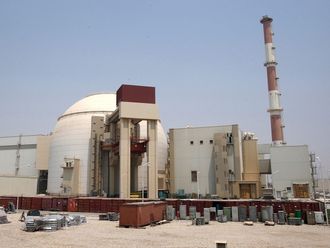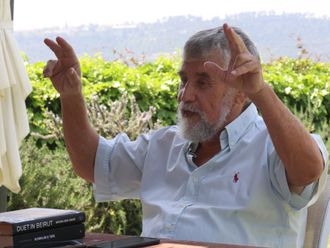Basra: At night when Basra's upscale Algeria district comes to life, Wissam Shawal rolls out his street-corner kebab stand and shapes the ground lamb onto skewers.
"It's a temporary job," says the university graduate. But he's had it for nine years.
A year after the Iraqi Army wrested control of the city from Shiite militias, Basra provides a glimpse of what the rest of Iraq could be like minus the violence. It's also a window on the kinds of challenges still facing the country.
People don't fear to leave their homes now. Suicide bombers are almost nonexistent. Today, the more "normal" concerns of finding a decent job - or any job - have replaced security as the biggest concern in one of Iraq's largest cities.
Up until a year ago, when Iranian-backed gunmen ruled the streets, the prospect of economic recovery was almost unthinkable.
The British, in charge of Iraq's south, had withdrawn from the city under attack from Shiite leader Moqtada Al Sadr's Mahdi Army. British development officials were banned from going into Basra, even if they'd wanted to. Now that it's secure enough to think about rebuilding this port city into Iraq's gateway to the world, the new provincial governor has big ambitions but few resources.
"We are aware that our abilities are limited. Our budget this year is one-third of what we had last year," says new governor Shiltagh Abboud Sharad.
Governor Sharad is from the same Dawa Party as Prime Minister Nouri Al Maliki. That link would ordinarily bode well for Basra's chances of getting more federal help. But the plunge in oil prices - from nearly $150 a barrel last year to around $50 a barrel, is hampering rebuilding.
Almost all planned capital spending for government ministries has disappeared as the 2009 budget has been cut - twice already this year.
"We want to raise the profile of Basra. The government previously didn't pay too much attention to the dense population here perhaps," says the governor, a professor of Arabic literature. "We intend it to be the economic heart for the whole of Iraq."
Right now it's a heart barely beating. Although the city has an educated work force and enough stability now to allow reconstruction, years of neglect and three wars in 30 years have left the infrastructure in such bad shape it will take hundreds of billions of dollars to repair.
At the nearby deep-water port of Umm Qasr, business has picked up dramatically since the port was wrenched from militia control. But shipping experts say it also needs a revamped infrastructure, guaranteed power, and additional berths before it approaches international standards. Business people still complain that the port is riddled with corruption and its payroll is inflated with unqualified and sometimes nonexistent employees - a problem throughout Iraq.
The new provincial government's priorities are maintaining security, repairing the damaged infrastructure, and addressing unemployment, said to be 30 to 50 per cent of the workforce - even higher than that in Baghdad.
Sharad says that much of the job creation will come from investment from neighbouring countries, including Iran and Kuwait, and from Iraqi expatriates.
Iran and Iraq recently signed memorandums of understanding meant to increase bilateral trade to $10 billion by 2010 - among the projects are a $1.5 billion deal to build a housing complex south of Basra. As with a $3.7 billion agreement for Italy to construct a new port, it is only in the feasibility planning stages.
As for private investment, most of the focus is on Iraq's oil industry. While there are potential fortunes to be made here in the southern oil fields, most big oil companies are hanging back, waiting for oil legislation that would make their position clearer under Iraqi law.
In interviews with a wide range of Iraqi officials and ordinary Basrawis, almost all said the promises of the British and the Americans to help rebuild the country after toppling President Saddam Hussain have failed to materialise. British officials say they have spent the equivalent of more than a billion dollars on reconstruction in Basra. But most Iraqis say that they will be remembered for withdrawing from the city when it got too dangerous.
- Christian Science Monitor
Basra Although the city is no longer under the grip of extremist militias, some residents worry that the militias are only lying in wait.
Most blame the country's open borders for lack of security. Basra's picturesque corniche along the Shatt Al Arab waterway is less than 15 miles from Iran. Badly hit in the eight-year Iran-Iraq war, Shiites here rose up against Saddam Hussain after his 1991 invasion of Kuwait, an uprising that was brutally put down. A decade of UN sanctions exacerbated the city's decay.
In the security vacuum left by the British, the poverty and desperation allowed militias to flourish. In Basra's biggest neighbourhood, Hayaniyah, an estimated 750,000 people are crammed into an area of about four square miles. Here, the militia stepped into the security vacuum and took control. And throughout Basra, they banned hairdressers, music, and alcohol as un-Islamic.
In the streets today, schoolgirls in white head scarves run to school past rivers of sewage. Down one of the twisting alleys, Raid Thamer Wadi sits outside his crumbling house in a wheelchair. He lost both legs two years ago, he says, when militiamen shot him as a punishment for drinking.
Thirteen people share his house. Only one has a job. Wadi's wife died years ago in a cooking fire. All the cooking and cleaning is done by his daughter Kafiyah, who dropped out of fourth grade to take care of him. "I'm too old to go back to school now," she says.
Wadi's wheelchair is broken and his primitive prosthetic legs weigh six pounds each - too heavy to walk. There is a palpable anger at what Raid sees as an invisible government.
"We thought it would be different after Saddam Hussain - we'd have a new government, maybe rebuild the city. What have they done for us?" he asks. "Nothing."
A former security adviser involved in the Iraqi military operation last year says that perception is part of why the militias gained such power.
"When the militias took hold of the city in the absence of government, they thought this was their right," says Majid Ahmad Al Sari, an adviser to the Ministry of Defence at the time. "When we suggested, 'That's it - the government is here now, your role has finished,' the militias used to say, 'We are not clashing with you - we found a security void and we filled it.' People used to go to the militia and religious officials for help before they went to any government office."
Last year, when Prime Minister Nouri Al Maliki sent two Iraqi Army divisions from the north to take back the city, he caught even his American partners by surprise.
The Iraqi Army operation, the biggest of this war, has allowed battered Basra to revive. In the south, the violence has been largely between Shiite militias, without the overlay of Sunni extremist attacks. While bombings in Baghdad are still a daily occurrence, roadside bombs are rare in Basra and suicide bombers practically nonexistent. This city isn't the warren of concrete blast walls and barbed wire seen in other Iraqi cities.
- Christian Science Monitor












